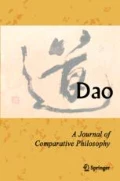Abstract
It is an assumed view in Chinese philosophy that the grammatical differences between English or Indo-European languages and classical Chinese explain some of the differences between the Western and Chinese philosophical discourses. Although some philosophers have expressed doubts about the general link between classical Chinese philosophy and syntactic form of classical Chinese, I discuss a specific hypothesis, i.e., the mass-noun hypothesis, in this essay. The mass-noun hypothesis assumes that a linguistic distinction such as between the singular terms and the predicates is sufficient to justify or necessarily leads to a specific ontological distinction such as the distinction between the particular and the universal. I argue that one cannot read off semantic properties simply from syntactic ones and hence the syntactic differences do not automatically translate into the semantic differences between languages, that the syntactic features of Chinese nouns do not have explanatory significance in explaining why the particular-universal problem does not arise in the classical period of Chinese philosophy, and that the part-whole ontology allegedly informed by the mass-noun-like semantics does not provide a natural or intuitive picture of the language-world relation.
Similar content being viewed by others
References
Ames, Roger. 1998. The Analects of Confucius. Translated with an Introduction by R. Ames & Henry Rosemont. New York: The Random House Publishing Group.
Baker, Mark. 2001. “Syntax.” In The Handbook of Linguistics. Ed. by Mark Aronoff & J. Rees-Miller. Malden, MA: Blackwell Publisher, 265–294.
Bao, Zhiming. 1990. “Language and World View in Ancient China.” Philosophy East & West 40: 195–219.
Croft, William. 2001. “Typology.” In The Handbook of Linguistics. Ed. by Mark Aronoff & J. Rees-Miller. Malden, MA: Blackwell Publisher, 337–368.
Graham, Angus C. 1989. Disputers of the Dao. Chicago & La Salle, Illinois: Open Court.
_____. 1990. “Three Studies of Kung-Sun Lung.” In his Studies in Chinese Philosophy & Philosophical Literature. Albany, NY: State University of New York Press, 125–215.
Haiman, John. 1983. “Iconic and Economic Motivation.” Language 59: 781–819.
Hale, Bob. 2006. “Universals and Particulars: Ramsey’s Skepticism.” In Universals, Concepts and Qualities: New Essays on the Meaning and Predicates. Ed. by P. F. Strawson and A. Chakrabarti. Burlington VT: Ashgate.
Hansen, Chad. 1983. Language and Logic in Ancient China. Ann Arbor, MI: The University of Michigan Press.
_____. 2003. “Later Mohism.” In Encyclopedia of Chinese Philosophy. Ed. by A. Cua. New York: Routledge.
Harbsmeier, Christophe. 1989. “Marginalia Sino-Logica.” In Understanding the Chinese Mind. Hong Kong: Oxford University Press, 125–166.
_____. 1991. “The Mass Noun Hypothesis and the Part-Whole Analysis of the White Horse Dialogue.” In Chinese Texts & Philosophical Contexts. Ed. by H. Rosemont, Jr. La Salle, Illinois: Open Court.
Haspelmath, Martin. 2003. “Against Iconicity and Markedness.” Stanford University, 6 March.
Mou, Bo. 2000. “The Structure of the Chinese Language and Ontological Insights: A Collective-Noun Hypothesis.” Philosophy East & West 49: 45–62.
Putnam, Hilary. 1974. “The ‘Innateness Hypothesis’ and Explanatory Models in Linguistics.” In The Philosophy of Language. Ed. by John Searle. Oxford: Oxford University Press.
Quine, Willard V. O. 1960. Word & Object. Cambridge, MA: The MIT Press.
_____. 1964. “Speaking of Objects.” In The Structure of Language. Ed. by J. A. Fordor & J. J. Katz. Englewood Cliffs, NJ: Prentice-Hall.
Rosemont, Henry, Jr. 1974. “On Representing Abstractions in Archaic Chinese.” Philosophy East & West 24: 71–88.
Searle, John. 1969. Speech Acts. London: Cambridge University Press.
Tan, Jiefu 譚戒甫. 2004. Mo Bian Fa Wei 墨辯發微 (Subtlety of the Mohist Disputations). Beijing 北京: Zhonghua Shuju 中華書局.
Xunzi. 2003. “Rectifying Names.” In Xunzi 荀子. Annotated by SUN Anbang 孫安邦 and MA Yinhua 馬銀華. Taiyuan 太原 : Shanxi Guji Chubanshe 山西古籍出版社..
Author information
Authors and Affiliations
Corresponding author
Rights and permissions
About this article
Cite this article
Yang, X. Do Differences in Grammatical Form between Languages Explain Differences in Ontology between Different Philosophical Traditions?: A Critique of the Mass-Noun Hypothesis. Dao 10, 149–166 (2011). https://doi.org/10.1007/s11712-011-9207-4
Published:
Issue Date:
DOI: https://doi.org/10.1007/s11712-011-9207-4




